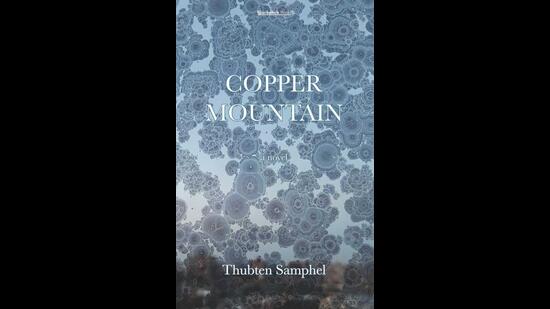Review: Copper Mountain by Thubten Samphel
Copper Mountain by Thubten Samphel is one of those rare meeting points of a book that brings together the cultural conflicts of a people, the politics of faith, the authoritarian government and private machinery of China, and an environmental disaster of epic proportions.
The novel begins with the largest hoard of copper being discovered in one of the most sacred Tibetan and Indian shrines in the world, Kailash Mountain. While mining the mountain is a major religious and spiritual issue, it also threatens to pollute the four major rivers whose source is nearby. All that stands in the way of this mining venture by a power-hungry government-backed corporation is a ragtag group of misfits that includes a wily abbot, a Tibetan nun, the owner of a mountain NGO, and a secret order. Together they must foil the attempts of the state machinery, physically foil mining attempts, and spiritually decolonise a holy mountain.
Samphel’s rigorous grounding of the plot in contemporary reality drives this novel forward. His expositions on class struggles, China’s ban and clone policy, the state ploy of securing reincarnations of spiritual leaders as a way of cementing their rule, and the vested interests that oppose any resolution of the issue of Tibet are as much a part of the novel as levitating, time-travelling monks and single-line messages passed on in dark jail cells.
Samphel uses economic ideology and history to arrive at the motives of his characters. Zhou Fatang, head of China Copper, is the epitome of a young nationalist heavily invested in the development of China’s economic muscle as a means to take over the world. He is influenced by China’s consciousness of its hundred years of humiliation by Western powers that used gunboat diplomacy and opium to ravage the nation. By contrast, Zhou’s secretary Yu Yang believes that while communism had created the revolution it was capitalism that held the nation together. Its new soldiers were motivated by profit and rising wages. Its brand of communist capitalism had helped China overcome all obstacles and led its people to embrace its new rulers. Samphel keeps the action going by adding multiple new motives. In between ideological clashes, we have characters driven by personal ambition, warlords with no allegiance, plots to undermine the state, and more. In particular, his characters comment on the creation of political chaos as a means of ascending political hierarchies and remaining relevant.
Samphel is quite even-keeled in his depiction of the Chinese people. In the novel, Sangye Dorje speaks of the new generation of educated Chinese youth who consider Tibetan Buddhism a national treasure and as world heritage in need of protection, preservation, and celebration. They rely on the Buddha’s words to understand their place in society and learn how to adapt to it.
Copper Mountain is also a moving picture of Tibet’s natural beauty and rich historical tradition. Through the personal diary of the official diarist for the PLA (People’s Liberation Army) in Tibet, Samphel speaks about Lhasa, the Barkhor market, and the Jokhang temple in the days before the liberation; the Lhasa that was at the heart of trade within Asia. Vendors from Xining, Ladakh, Kathmandu, Kalimpong, Bhutan, and Tawang had shops here. Lhasa, the cosmopolitan city, that attracted Indians, Bhutanese, Chinese, and Nepalese, among others. He speaks tenderly of the monasteries that served as universities attracting students from all over the world.

Despite grappling with such heavy themes, at its heart, Copper Mountain is a fast-paced enthralling read elevated by Samphel’s dark and playful humour. The Tibetan monk Chiu Rinpoche’s denunciation of the Kailash Mountain is hilariously framed within a Marxist and materialistic perspective. The Indian colonisation of Tibet’s spiritual life is an inspired part of this critique. Samphel also packs in several punch lines at the expense of a few characters. Chen Kuichen, Tibet’s party secretary, remarks that China has the best, most accurate weather forecast in the world. The same party secretary is introduced as “summer grass and winter worm”, a reference to a caterpillar fungus. These subtle witticisms make the novel a rather rollicking read.
Copper Mountain has memorable characters and combines a good thriller with an environmental conspiracy. I hope Samphel’s themes become emblematic of more Tibetan fiction, of a form that takes its roots from its rich history but wrestles with contemporary environmental and political issues and is infused with a local flavour of humour for that extra kick.
Percy Bharucha is a freelance writer and illustrator with two biweekly comics, The Adult Manual and Cats Over Coffee. Instagram: @percybharucha
Enjoy unlimited digital access with HT Premium
Subscribe Now to continue reading

Copper Mountain by Thubten Samphel is one of those rare meeting points of a book that brings together the cultural conflicts of a people, the politics of faith, the authoritarian government and private machinery of China, and an environmental disaster of epic proportions.
The novel begins with the largest hoard of copper being discovered in one of the most sacred Tibetan and Indian shrines in the world, Kailash Mountain. While mining the mountain is a major religious and spiritual issue, it also threatens to pollute the four major rivers whose source is nearby. All that stands in the way of this mining venture by a power-hungry government-backed corporation is a ragtag group of misfits that includes a wily abbot, a Tibetan nun, the owner of a mountain NGO, and a secret order. Together they must foil the attempts of the state machinery, physically foil mining attempts, and spiritually decolonise a holy mountain.

Samphel’s rigorous grounding of the plot in contemporary reality drives this novel forward. His expositions on class struggles, China’s ban and clone policy, the state ploy of securing reincarnations of spiritual leaders as a way of cementing their rule, and the vested interests that oppose any resolution of the issue of Tibet are as much a part of the novel as levitating, time-travelling monks and single-line messages passed on in dark jail cells.
Samphel uses economic ideology and history to arrive at the motives of his characters. Zhou Fatang, head of China Copper, is the epitome of a young nationalist heavily invested in the development of China’s economic muscle as a means to take over the world. He is influenced by China’s consciousness of its hundred years of humiliation by Western powers that used gunboat diplomacy and opium to ravage the nation. By contrast, Zhou’s secretary Yu Yang believes that while communism had created the revolution it was capitalism that held the nation together. Its new soldiers were motivated by profit and rising wages. Its brand of communist capitalism had helped China overcome all obstacles and led its people to embrace its new rulers. Samphel keeps the action going by adding multiple new motives. In between ideological clashes, we have characters driven by personal ambition, warlords with no allegiance, plots to undermine the state, and more. In particular, his characters comment on the creation of political chaos as a means of ascending political hierarchies and remaining relevant.
Samphel is quite even-keeled in his depiction of the Chinese people. In the novel, Sangye Dorje speaks of the new generation of educated Chinese youth who consider Tibetan Buddhism a national treasure and as world heritage in need of protection, preservation, and celebration. They rely on the Buddha’s words to understand their place in society and learn how to adapt to it.
Copper Mountain is also a moving picture of Tibet’s natural beauty and rich historical tradition. Through the personal diary of the official diarist for the PLA (People’s Liberation Army) in Tibet, Samphel speaks about Lhasa, the Barkhor market, and the Jokhang temple in the days before the liberation; the Lhasa that was at the heart of trade within Asia. Vendors from Xining, Ladakh, Kathmandu, Kalimpong, Bhutan, and Tawang had shops here. Lhasa, the cosmopolitan city, that attracted Indians, Bhutanese, Chinese, and Nepalese, among others. He speaks tenderly of the monasteries that served as universities attracting students from all over the world.

Despite grappling with such heavy themes, at its heart, Copper Mountain is a fast-paced enthralling read elevated by Samphel’s dark and playful humour. The Tibetan monk Chiu Rinpoche’s denunciation of the Kailash Mountain is hilariously framed within a Marxist and materialistic perspective. The Indian colonisation of Tibet’s spiritual life is an inspired part of this critique. Samphel also packs in several punch lines at the expense of a few characters. Chen Kuichen, Tibet’s party secretary, remarks that China has the best, most accurate weather forecast in the world. The same party secretary is introduced as “summer grass and winter worm”, a reference to a caterpillar fungus. These subtle witticisms make the novel a rather rollicking read.
Copper Mountain has memorable characters and combines a good thriller with an environmental conspiracy. I hope Samphel’s themes become emblematic of more Tibetan fiction, of a form that takes its roots from its rich history but wrestles with contemporary environmental and political issues and is infused with a local flavour of humour for that extra kick.
Percy Bharucha is a freelance writer and illustrator with two biweekly comics, The Adult Manual and Cats Over Coffee. Instagram: @percybharucha
Enjoy unlimited digital access with HT Premium
Subscribe Now to continue reading

